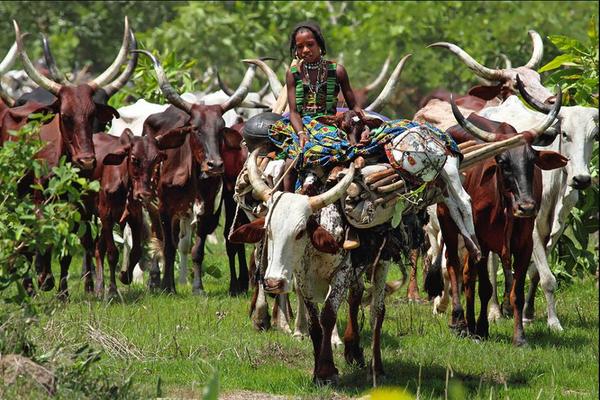
Rev. Fr. Attah Anthony Agbali
Fulani transient herdsmen, since about presumably the colonial era have been moving into Igala land for cattle grazing.
During the course of such Fulani transience and transhumance, the Igala have always welcomed and granted them settlements sites within various territories to reside. For instance, between Ajagumu and Ajiyolo in Dekina, Local Government, Ojuwo Omachi and Akpagidigbo, Ofu Local Government area, Fulani settlements exist.
These settlement sites were thought to be transient and seasonal. However, overtime, these Fulani camp settlements began acquiring features of permanent residential domains.
In fact, as long observed by the British expeditions of the Fulani in Nupe land (Allen and Thompson, Vol. 2: 106, Kulapo, 1999:109-110), increasingly some Fulani males intermarried local Igala females while hardly the reverse was the case with Igala males intermarrying Fulani females. In most cases Fulani would abhor such practices and discount such notions entirely.
On some occasions the attempts of some rascally Igala young males to attempt dating Fulani females also provoke violent altercations and communal crises between the settlers and the Fulani settlements. As was the case in 19th century Nupe, over times such trends are like to expand Fulani influences and political domination among the Igala through miscegenation.
For the most part, the Fulani herdsmen are supposed to respect their hosts and their rules of migrant engagements, with conflicts always brought to the attention of the traditional authorities for settlements. In general, the Fulani within their settlements operate according to their own cultural codes and norms, without undue interference from the host communities.
Tributes and exchange of gifts are also for the most part expected rather than outright demand from the Fulani to their territorial hosts’ traditional authorities. In the past certain skirmishes occur between individual Fulani and landowners especially farmers for encroachment on farmland and destruction of farm products. Often, in such scenarios local authorities are involved but in occasional situation Fulani herdsmen have taken the offensives through altercations through belligerent fights with locals inappropriately using their staff and machetes or swords.
The magnitudes of such altercations while it exists hardly constituted a problem for the overall cordiality and peaceful relationships existing between settlers and hosts. Even once in a while, cases of cattle rustling also provides another arena for inter-group conflict between Fulani herdsmen and their hosts. It is often known that in such cases-criminal in nature- that Fulani often engages both their host communities’ leaders and law enforcement through inducements.
The New Waves and the Tides of Vicious Inter-group Violence:
More than in the past all over Nigeria, including in Igala land, there are recorded accreting incidences of Fulani’s atrocities often perpetuated by herdsmen in confrontations with members of their host societies.
Often, as noted by Tenuche and Ifatimehin (2009), the core issues driving most of these conflicts hinge upon appropriate land use dynamics, specifically the destruction of farmland and products and communal water sources pollution. Such ecologically driven contexts also is aligned to the issue of rights claimant often defined along the lines of indigenous versus migrant populations, and land tenure rights.
Some of the discourse have also began to taken on broader ethnic identities measured against national rights. While, in Igalaland, the land conveyance to Fulani was initially seen as provided for temporal settlement, as a result of ecological pressures and pastoralist ideologies framed in terms of pastoralist ideologies that makes home of grazing opportunities, some of the settlements or camp that hitherto were considered as temporary habitations are increasingly becoming either semi-permanent or acquiring full permanent residential status. Increasingly, Fulani are arguing also that as Nigerians they have the rights to dwell in any location of their choice.
Indeed, this is constitutionally right as ideally any Nigerian should be able to live in peace anywhere across the nation without fear of molestations. But, within the texture of the Nigerian geopolitical mapping there were ethnic enclaves and demarcated territories specific to ethnic groupings.
Further, the stretching of such national rights to exist anyway is also weighted by the indigenous population with memories and experiences that they or their relatives inhabiting spatial niches in many northern cities and climes where Hausa-Fulani identity predominates are incapable of such bold self-assertions and claiming similar rights without adverse recriminations. This seeming lack of reciprocity in terms of national rights, is also measured against past historical circumstances of Fulani expansionist schemes such as in Hausa land, Nupe, Ilorin, and other territories that were within a spate of less than a century were swiftly and atrociously overran by Fulani militant forces.
In most cases, these societies had either welcomed or invited the Fulani to their aid only to brutally pay for with their independence, lives, and fortunes. Stories of Fulani brutality includes the gory sights and sacrilegious killing of pregnant women and vicious ripping of their wombs to exterminate their offspring in vitro (cf. Elphinstone, 1921:35). The memory of the Fulani-Nupe Jihadist schemes and horrors that brought the Bassa Nge and Bassa Komo, including some Igbirra group into Igala territory offering them refugee sanctuary under the protection of the Attah of Igala remains veldish, and not so easily buried, transmitted and ingrained in many consciousness (Clifford, 1944; Bryan-Hall, 1908;)
Sometimes these enlarging conflicts take a toll on the communities. Increasingly these worsening scenario are taking a life of its own with many Fulani disrespecting their host communities’ norms and taking the laws into their own hands, acting impetuously and violently. Such affronts are also precipitating accreting blood clashes within different locales of Igala land. Prior to such specters, occasional skirmishes with local communities provoke tensile relationships between the autochthonous natives and the settler Fulani migrants are often amicably resolved through the mechanisms of the local traditional and public authorities, law enforcements and representatives of the Fulani settlers.
As already noted, in spite of the indigenous population’s suspicion regarding Fulani inducements of these officials through bribes and other covet gifts, often they would conform to settlements, even if unpalatable, presided and endorsed by these officials. In 2016, following Fulani false alarms regarding cattle rustling, the Nigeria Police force through biased siding with Fulani, by carrying out arrests of certain community leaders in Umomi, engendered protests by youths. During that protest the police arbitrarily killed two youths firing inordinately into the protesting crowd (Folarin 2016; Dan Suleiman, 2016).
Of recent, over 20 persons were either injured or killed by compulsive Fulani herdsmen offensives around Ojuwo Omachi and Akpagidigbo communities in Ofu Local Government, and in communities in Dekina and Omala Local Government areas. Some of the conflicts such as those around Abejukolo and Bagana have seen the killing and decimation and arson of entire communities (Akinfehinwa, 2017; Jimoh, 2017).
To be continued

